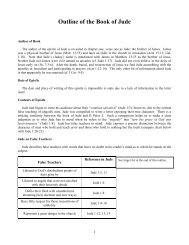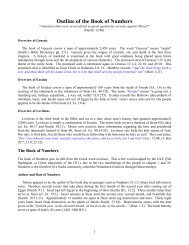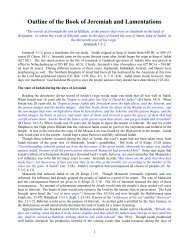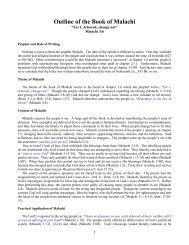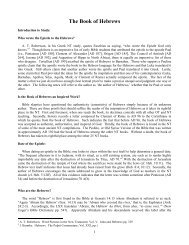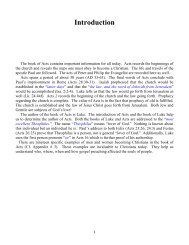Outline of the Book of I Timothy - The Floral Heights Church of Christ
Outline of the Book of I Timothy - The Floral Heights Church of Christ
Outline of the Book of I Timothy - The Floral Heights Church of Christ
Create successful ePaper yourself
Turn your PDF publications into a flip-book with our unique Google optimized e-Paper software.
preacher and an apostle (I speak <strong>the</strong> truth, I lie not), a teacher <strong>of</strong> <strong>the</strong> Gentiles in faith and truth"<br />
(2:5-7).<br />
1. <strong>Christ</strong>ians are to pray for all men, kings, and political leaders. <strong>Christ</strong>ians are to seek out a life <strong>of</strong><br />
peace and reverential respect for authority that <strong>the</strong>y may be approved <strong>of</strong> God.<br />
2. Why? Because <strong>the</strong>re is only one God (as opposed to multitudes to consider). Not only is <strong>the</strong>re<br />
one God but <strong>the</strong>re is only "one mediator between God and men." A “mediator” (mesites) = “a<br />
mediator (a person who serves as an intermediary to reconcile differences), umpire, arbitrator”<br />
(LS 499) (see Heb. 7:25; 8:6; 9:15 etc.). <strong>Christ</strong> gave himself as a "ransom for all" (antilutron) =<br />
"a ransom [<strong>the</strong> release <strong>of</strong> a person or property in return for payment <strong>of</strong> a demanded price]<br />
(Moulton 32). Paul tells us that <strong>Christ</strong> "purchased <strong>the</strong> church with his blood" (Acts 20:28b).<br />
3. <strong>The</strong> testimony <strong>of</strong> <strong>Christ</strong> sacrifice and redemption <strong>of</strong> man is to be borne in its own time. Paul was<br />
<strong>the</strong>reby not only appointed an apostle (see I Tim. 1:1, 12) but also a "preacher" (kerux) = "a<br />
herald, public messenger; a proclaim(er), publisher, preacher... public inculcation, preaching" (see<br />
Moulton's comments at pp. 230 for more uses <strong>of</strong> <strong>the</strong> Greek kerux) (Moulton 230) (see study # 10<br />
and # 14; <strong>The</strong> Identity <strong>of</strong> <strong>the</strong> Preacher).<br />
4. Paul was an apostle, preacher, and "teacher" (didaskalos) “one who teaches concerning <strong>the</strong> things<br />
<strong>of</strong> God, and <strong>the</strong> duties <strong>of</strong> man;” (Thayer 144). That which Paul was sent as an ambassador on<br />
behalf <strong>of</strong> Jehovah God to man that he might preach and teach was none o<strong>the</strong>r than "faith and<br />
truth."<br />
5. Summary statement <strong>of</strong> Paul’s request (vs. 1-4): Paul had laid <strong>the</strong> foundation <strong>of</strong> instruction to<br />
<strong>Timothy</strong> in Chapter one. He warned <strong>Timothy</strong> not to allow any <strong>Christ</strong>ian to follow ano<strong>the</strong>r<br />
doctrine nor add any admixtures to <strong>the</strong> teachings <strong>of</strong> <strong>Christ</strong>. Paul instructs <strong>Timothy</strong> to teach <strong>the</strong><br />
power <strong>of</strong> <strong>the</strong> gospel. God’s rich mercy can forgive even <strong>the</strong> vilest sinners <strong>of</strong> whom Paul felt he<br />
was chief (I Tim. 1:15). In Chapter two, Paul exhorts (urges) <strong>Timothy</strong> and <strong>the</strong> brethren in<br />
Ephesus to pray for <strong>the</strong> governing authorities that existed so that <strong>the</strong> Ephesian <strong>Christ</strong>ians may live<br />
a Godly life with no agitation or disturbance. God authorizes such prayers even at a time when<br />
<strong>the</strong> most evil Roman Emperor, Nero, sat on <strong>the</strong> throne <strong>of</strong> Rome (see appendix # 11; <strong>The</strong> <strong>Christ</strong>ian<br />
and Civil Government). We too should give God thanks for <strong>the</strong> tranquility in which we now<br />
worship. Our prayers to God are to be directed at keeping this serenity <strong>of</strong> worship. Men can hear<br />
<strong>the</strong> truth and be saved in such an atmosphere. <strong>Christ</strong>ians are more likely to hold to <strong>the</strong> sound<br />
doctrine in such an atmosphere. <strong>The</strong> book <strong>of</strong> Acts proves this point as Luke records, "So <strong>the</strong><br />
church throughout all Judaea and Galilee and Samaria had peace, being edified; and, walking in<br />
<strong>the</strong> fear <strong>of</strong> <strong>the</strong> Lord and in <strong>the</strong> comfort <strong>of</strong> <strong>the</strong> Holy Spirit, was multiplied” (Acts 9:31).<br />
II. Conduct in <strong>the</strong> Assembly <strong>of</strong> Saints (men and women) (Consider I Tim. 3:14-15) (2:8-15):<br />
A. "I desire <strong>the</strong>refore that <strong>the</strong> men pray in every place, lifting up holy hands, without wrath and<br />
disputing" (2:8).<br />
1. <strong>The</strong> next twenty plus verses will take into consideration, "how men ought to behave <strong>the</strong>mselves in<br />
<strong>the</strong> house <strong>of</strong> God, which is <strong>the</strong> church <strong>of</strong> <strong>the</strong> living God" (I Tim. 3:15). <strong>The</strong> context indicates that<br />
Paul has under consideration peace and reverential respect for authority that <strong>the</strong> gospel may have<br />
success in <strong>the</strong> lives <strong>of</strong> men. When it comes to <strong>the</strong> church that same peace and reverence for<br />
authority should exist which will also provide an atmosphere <strong>of</strong> peace that man may worship as<br />
God directs.<br />
2. Note that prayer is to be <strong>of</strong>fered by men only (see appendix # 12; Worship <strong>of</strong> <strong>the</strong> <strong>Church</strong>). Men<br />
are to lift up holy hands. This phrase is figurative: (cf. Job 17:9; Psalms 24:9 and James 4:8).<br />
Jeremiah uses this type <strong>of</strong> language at Lamentations 3:41 to illustrate <strong>the</strong> fact that man's heart is<br />
lifted in prayer ra<strong>the</strong>r than <strong>the</strong> literal hands. Jeremiah writes, "Let us lift up our heart with our<br />
hands unto God in <strong>the</strong> heavens." <strong>The</strong> apostle Peter called for men to be holy (I Pet. 1:15-16).<br />
B. "In like manner, that women adorn <strong>the</strong>mselves in modest apparel, with shamefastness and sobriety; not<br />
with braided hair, and gold or pearls or costly raiment; but (which becomes women pr<strong>of</strong>essing<br />
godliness) through good works" (2:9-10).<br />
1. Paul moves from <strong>the</strong> men to <strong>the</strong> women regarding how <strong>the</strong>y are to conduct <strong>the</strong>mselves. Women<br />
are instructed to "adorn" <strong>the</strong>mselves in “modest” apparel. <strong>The</strong> idea <strong>of</strong> "adorning" (katastole) =<br />
13



